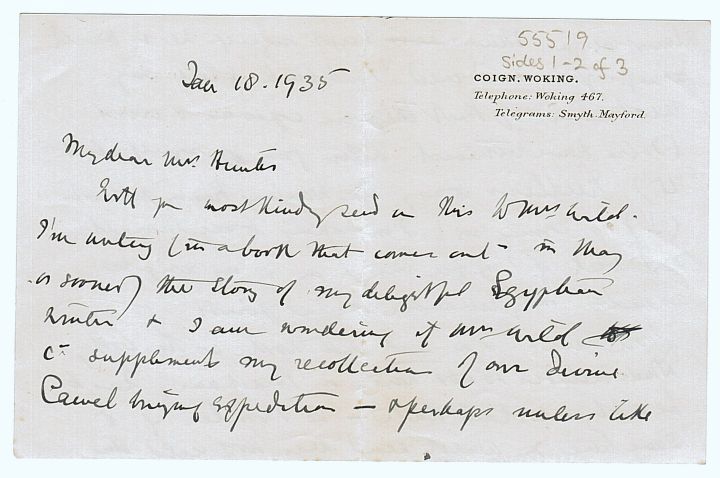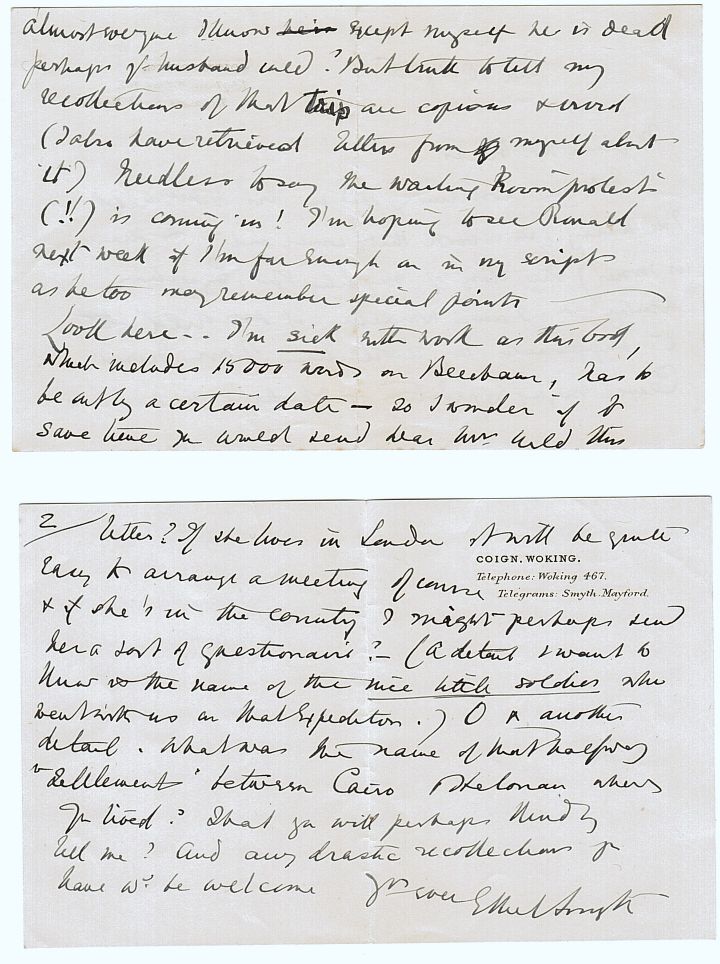
SMYTH
(Dame Ethel, 1858-1944, Composer, Writer & Suffragette)
Autograph Letter Signed to Mrs Hunter,
(Hylda, sister of Sir Eldon Gorst, Consul-General in Cairo, and wife of Captain George G. Hunter, before WWI attached to the British Agency), asking her "most kindly to send on this to Mrs Wild", explaining that she is writing "(in a book that comes out in May or sooner) the story of my delightful Egyptian winter", and wondering if "Mr Wild cd. supplement my recollection of our divine Camel buying expedition - & perhaps unless like almost everyone I know except myself he is dead perhaps yr. husband could? ... Needless to say the waiting Room 'protest' (!) is coming in!", she is hoping similarly "to see Ronald next week", Sir Ronald Storrs, (1881-1955, the Orientalist and Colonial Governor, who was also at the Agency, and to whom her book is dedicated), she then exclaims "Look here - I'm sick with work on this book ... which includes 15000 words on Beecham", (Sir Thomas, 1848-1961, the conductor), and asks Mrs Hunter to "send dear Mrs Wild" the present letter, in hopes of meeting, "I might perhaps send her a questionnaire" including "the names of the nice little soldiers who went with us ... What was the name of that halfway 'Settlement' between Cairo & Helouan where you lived? ... any drastic recollections you have wd. be welcome", ending "Yrs ever", 3 sides oblong 8vo., Coign, Woking, 18th January
The book was 'Beecham and Pharaoh', 1935, in two parts, 'Thomas Beecham. Fantasia in B# major', and 'Egypt before England's Exodus: a fragment of an autobiography'. From 1911-1913, Ethel Smyth fought for women's suffrage, then, on her release from Holloway, "to avoid the pull of politics", spent December 1913 - May 1914 in Egypt. There she composed her comic opera 'The Boatswain's Mate', after the story by W.W. Jacobs, first performed in London in 1916. In May 1914, before leaving, she recast and shortened the whole Overture and brought in her stirring tune the 'March of the Women' (1911). Although Mrs Pankhurst was "safe in Paris", she was never far from Ethel Smyth's mind, and she wrote to her regularly.
Every year Captain Hunter, as director of the Coastguard Service, went south to the great fair in the Sudan, to replenish his stock of camels. The journey was a mixture of train, steamer and camping in the desert. The 'waiting room protest' was about facilities at Cairo Railway Station - rather shamefacedly Ethel Smyth and Mrs Hunter found they existed after all in a remote room, "full of veiled ladies". The 'settlement', favoured by Europeans, was at Meadi (Maadi al Khabiri, on the railway south of Cairo, east of the Nile). The other half of the book is a cheerful but sensitive and valuable account of Beecham, from childhood onwards.
Item Date:
1935
Stock No:
55519


<< Back